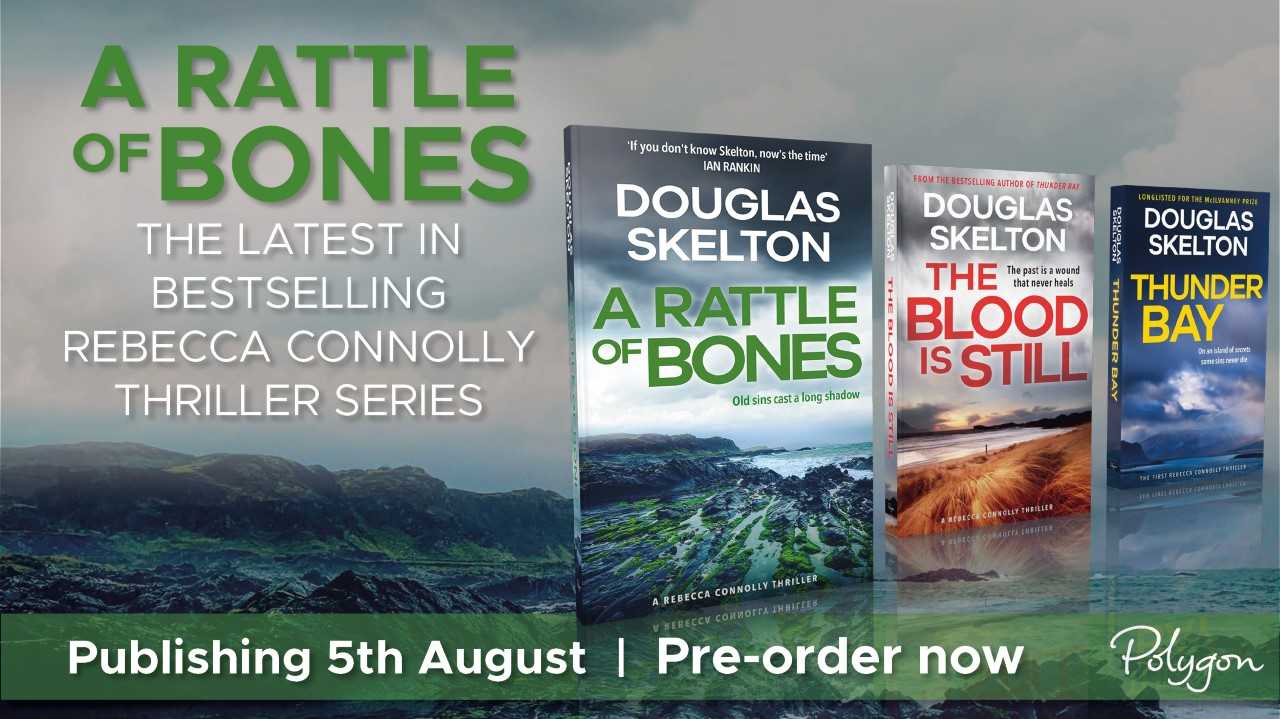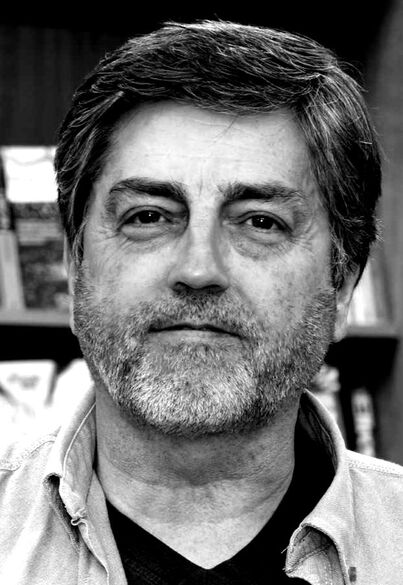
It gives me enormous pleasure to welcome Douglas Skelton onto the website today. Douglas is a crime writer of both fiction and non-fiction. His novels are set in Scotland - either the tough streets of Glasgow that he knew as a child or the majestically wild Scottish highlands.
In the words of The Scotsman, 'Skelton's talent is casting his descriptive eyes on the familiar and rendering truthful characters with a believable backstory.'
Alex: Tell us a bit about yourself, Douglas.
Douglas: I was born in Glasgow. My mother was there at the time. I think that might be a Chic Murray joke. If it's not, it should be.
We moved around a lot. From Glasgow to Manchester (Stretford and Ashton-Under-Lyne), back to Glasgow, then to Cumbernauld, then East Kilbride. The latter two both new towns near Glasgow. I feel there was a restlessness there of which I was not a part and in which I had no say. Mind you, I've moved about, too, various parts of Glasgow and then to Ayrshire and now back closer to the city in Renfrewshire, so I can't point any fingers.
I've been writing for as long as I remember. I can recall, perhaps aged 7 or so, lying on the floor of our flat in Springburn, in the north of the city, writing a crime story called 'Who Killed Cock Robin?', in which a TV personality - Cock Robin - is murdered on camera. Years later I learned that Ed McBain, one of my favourites, wrote a similar story in '80 Million Eyes.' Mine was better! (It wasn't really).
I love reading, love movies, love music. I also enjoy going for walks with my dog, which is something I'll be doing once I've completed this.
In the words of The Scotsman, 'Skelton's talent is casting his descriptive eyes on the familiar and rendering truthful characters with a believable backstory.'
Alex: Tell us a bit about yourself, Douglas.
Douglas: I was born in Glasgow. My mother was there at the time. I think that might be a Chic Murray joke. If it's not, it should be.
We moved around a lot. From Glasgow to Manchester (Stretford and Ashton-Under-Lyne), back to Glasgow, then to Cumbernauld, then East Kilbride. The latter two both new towns near Glasgow. I feel there was a restlessness there of which I was not a part and in which I had no say. Mind you, I've moved about, too, various parts of Glasgow and then to Ayrshire and now back closer to the city in Renfrewshire, so I can't point any fingers.
I've been writing for as long as I remember. I can recall, perhaps aged 7 or so, lying on the floor of our flat in Springburn, in the north of the city, writing a crime story called 'Who Killed Cock Robin?', in which a TV personality - Cock Robin - is murdered on camera. Years later I learned that Ed McBain, one of my favourites, wrote a similar story in '80 Million Eyes.' Mine was better! (It wasn't really).
I love reading, love movies, love music. I also enjoy going for walks with my dog, which is something I'll be doing once I've completed this.
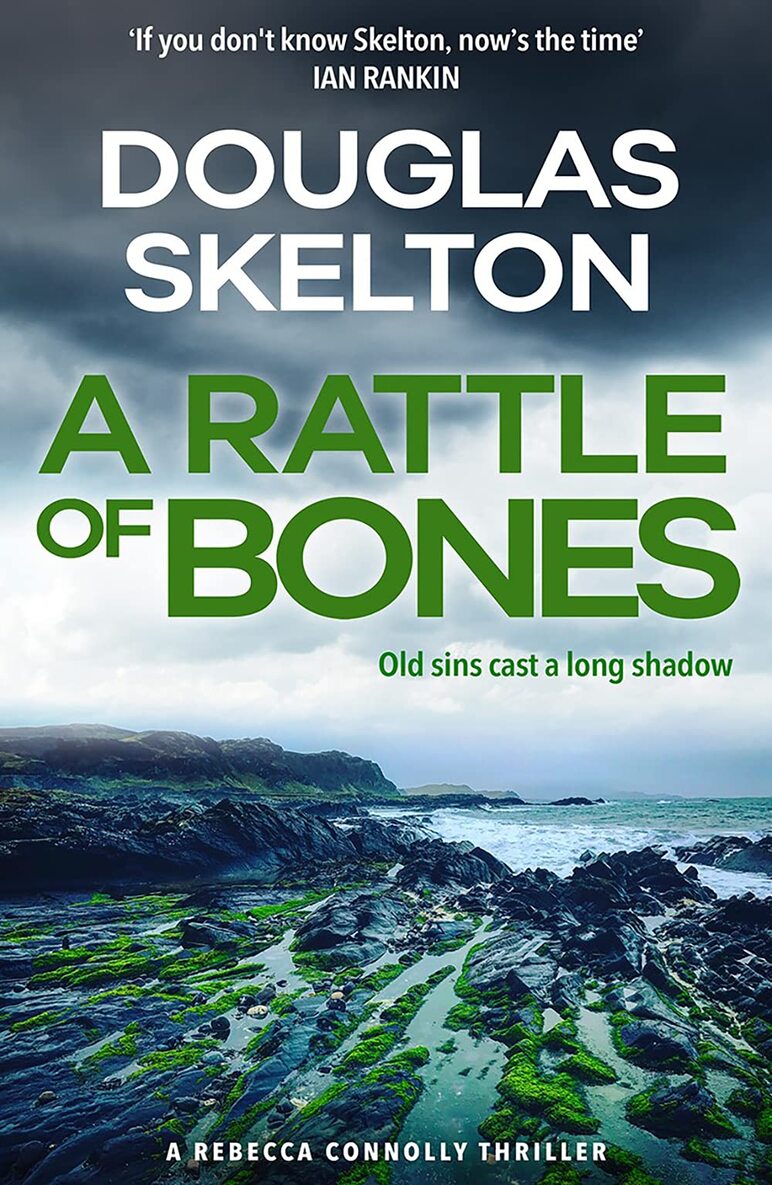
Alex: How would you describe your writing, and are there particular themes that you like to explore?
Douglas: I like to think my writing is accessible, entertaining and (hopefully) varied. There are no particular themes of which I am aware.
Alex: Are you a writer that plans a detailed synopsis or do you set out with a vague idea and let the story unfold as you write?
Douglas: I tackle it head on and hope for the best. I usually have a beginning, a few high points I would like to hit - isolated scenes or some kind of reversal - and sometimes have a notion as to how it will end but that's it. There are times I do wish I had the discipline to plan ahead but I'm too impatient and, anyway, the chances are I would change it all half way through when another idea strikes me.
Alex: Tell us about your latest novel.
Douglas: A RATTLE OF BONES is the third in my Rebecca Connolly series set in the Scottish Highlands and Islands. This one harks back to the real life Appin murder of 1752, when a man who was almost certainly innocent was excecuted for the murder of a Government official because it was politically expedient and because he was a Jacobite sympathiser. In the present day, his namesake is also serving a sentence for a murder he may not have committed and Rebecca Connolly, a local reporter, is following the story while also being stalked by a nasty bit of work who has taken exception to a court report filed by her agency.
Although it does refer to the previous two books, this one can be read on its own. I would recommend reading THUNDER BAY and THE BLOOD IS STILL though. Just because. That concludes the word from our sponsor.
Douglas: I like to think my writing is accessible, entertaining and (hopefully) varied. There are no particular themes of which I am aware.
Alex: Are you a writer that plans a detailed synopsis or do you set out with a vague idea and let the story unfold as you write?
Douglas: I tackle it head on and hope for the best. I usually have a beginning, a few high points I would like to hit - isolated scenes or some kind of reversal - and sometimes have a notion as to how it will end but that's it. There are times I do wish I had the discipline to plan ahead but I'm too impatient and, anyway, the chances are I would change it all half way through when another idea strikes me.
Alex: Tell us about your latest novel.
Douglas: A RATTLE OF BONES is the third in my Rebecca Connolly series set in the Scottish Highlands and Islands. This one harks back to the real life Appin murder of 1752, when a man who was almost certainly innocent was excecuted for the murder of a Government official because it was politically expedient and because he was a Jacobite sympathiser. In the present day, his namesake is also serving a sentence for a murder he may not have committed and Rebecca Connolly, a local reporter, is following the story while also being stalked by a nasty bit of work who has taken exception to a court report filed by her agency.
Although it does refer to the previous two books, this one can be read on its own. I would recommend reading THUNDER BAY and THE BLOOD IS STILL though. Just because. That concludes the word from our sponsor.
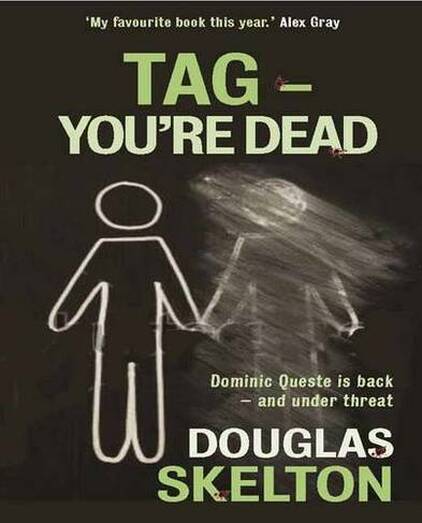
Alex: What was the first book you read?
Douglas: Oooh - I have a memory of reading Two Doggy Tales by Edith Blyton, I think the only one of hers I ever read. After that it's a book called Seventh Cavalry by Jeff Jeffries, a fictional tale set around the battle of the Little Big Horn.
Alex: How much research do you do and what does it usually entail?
Douglas: Much of what research I need has already been done as a journalist and when writing - and investigating for Glasgow solicitors - real life crime. Anything else is done on an ad hoc basis. I identify what I need to know and take it from there. It might entail sourcing and reading a book on a subject, perhaps something online from dependable sources or, preferably, speaking to someone in the know.
Alex: Do you ever base your characters on people you have encountered in real life?
Douglas: No. I will use certain characteristics, maybe a turn of phrase or an outlook. I will also pick things up from absolute strangers that can filter into the writing. But none of my characters are based on anyone living or dead. My lawyer tells me.
Alex: Which was the last book you read that blew you away?
Douglas: I'm not easily blown away, I'm afraid. I've read a lot of books by fellow authors which are very good - from Denzil Meyrick, Caro Ramsay, Michael J. Malone, Neil Broadfoot, Therea Talbot, Morgan Cry, Mark Leggatt and many more. I've been disappointed in recent work by some big name authors of late - I won't mention names and none of them are from the UK. I've also read some much hyped work that has fallen short for me, at least. Of course, it's purely subjective - it doesn't make me right.
Douglas: Oooh - I have a memory of reading Two Doggy Tales by Edith Blyton, I think the only one of hers I ever read. After that it's a book called Seventh Cavalry by Jeff Jeffries, a fictional tale set around the battle of the Little Big Horn.
Alex: How much research do you do and what does it usually entail?
Douglas: Much of what research I need has already been done as a journalist and when writing - and investigating for Glasgow solicitors - real life crime. Anything else is done on an ad hoc basis. I identify what I need to know and take it from there. It might entail sourcing and reading a book on a subject, perhaps something online from dependable sources or, preferably, speaking to someone in the know.
Alex: Do you ever base your characters on people you have encountered in real life?
Douglas: No. I will use certain characteristics, maybe a turn of phrase or an outlook. I will also pick things up from absolute strangers that can filter into the writing. But none of my characters are based on anyone living or dead. My lawyer tells me.
Alex: Which was the last book you read that blew you away?
Douglas: I'm not easily blown away, I'm afraid. I've read a lot of books by fellow authors which are very good - from Denzil Meyrick, Caro Ramsay, Michael J. Malone, Neil Broadfoot, Therea Talbot, Morgan Cry, Mark Leggatt and many more. I've been disappointed in recent work by some big name authors of late - I won't mention names and none of them are from the UK. I've also read some much hyped work that has fallen short for me, at least. Of course, it's purely subjective - it doesn't make me right.
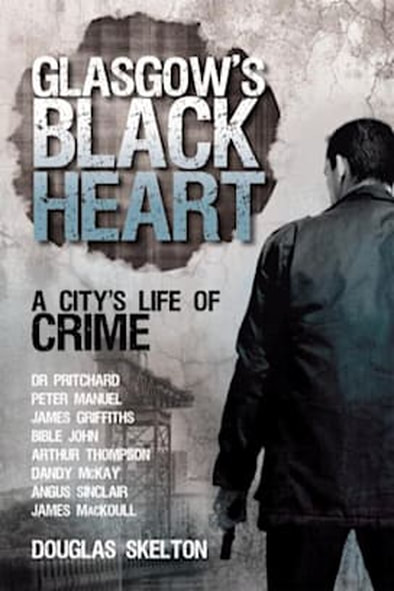
Alex: How do you market your books?
Douglas: I think very badly! I do some social media, I'll do anything bloggers ask, podcasts if invited. In normal times I would make some bookshop and library appearances but these aren't normal times. In years past I've had a busy schedule between festivals and performances of comedy plays and panels of which I am a part but everything fell by the wayside last year and into this year. I do miss performing and doing it digitally just isn't the same.
Alex: What are your interests aside from writing? And what do you do to unwind?
Douglas: As I said, I'm a movie fan so I'm generally found watching something, of late older movies because I find much of what they are now making is of little interest. Too many super heroes, too much finger wagging, too many agendas. I sound like an old fogey (there's a reason for that - I am!). The real unwinding comes through music, mostly film music. If life is stressful, I'll put on some John Barry and let his melodies soothe me.
Alex: Which authors do you particularly admire and why?
Douglas: I've already mentioned some home grown authors but I am drawn very much to US writers. I more or less grew up reading Ed McBain. Nowadays, I grab the latest from Robert Crais with both hands. I've also enjoyed the work of Dennis Lehane and John Connolly.
Alex: Thank you so much for sharing this with us Douglas. I really admire authors like yourself who can write without planning every detail in advance. Anyway, good luck with A Rattle of Bones. It sounds like a terrific read. I shall certainly look out for it.
Douglas: Thank you, Alex.
Douglas: I think very badly! I do some social media, I'll do anything bloggers ask, podcasts if invited. In normal times I would make some bookshop and library appearances but these aren't normal times. In years past I've had a busy schedule between festivals and performances of comedy plays and panels of which I am a part but everything fell by the wayside last year and into this year. I do miss performing and doing it digitally just isn't the same.
Alex: What are your interests aside from writing? And what do you do to unwind?
Douglas: As I said, I'm a movie fan so I'm generally found watching something, of late older movies because I find much of what they are now making is of little interest. Too many super heroes, too much finger wagging, too many agendas. I sound like an old fogey (there's a reason for that - I am!). The real unwinding comes through music, mostly film music. If life is stressful, I'll put on some John Barry and let his melodies soothe me.
Alex: Which authors do you particularly admire and why?
Douglas: I've already mentioned some home grown authors but I am drawn very much to US writers. I more or less grew up reading Ed McBain. Nowadays, I grab the latest from Robert Crais with both hands. I've also enjoyed the work of Dennis Lehane and John Connolly.
Alex: Thank you so much for sharing this with us Douglas. I really admire authors like yourself who can write without planning every detail in advance. Anyway, good luck with A Rattle of Bones. It sounds like a terrific read. I shall certainly look out for it.
Douglas: Thank you, Alex.
